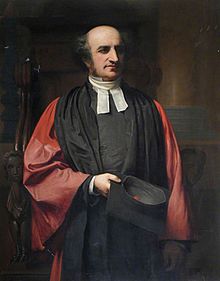Francis Jeune (22 May 1806 – 21 August 1868), also known as François Jeune, was a Jersey-born clergyman, schoolmaster, and academic who served as Dean of Jersey (1838–1844) Master of Pembroke College, Oxford (1844–1864), and Bishop of Peterborough (1864–1868).[1]
Francis Jeune | |
|---|---|
| Bishop of Peterborough | |
 | |
| Diocese | Peterborough |
| In office | 1864–1868 |
| Predecessor | George Davys |
| Successor | William Connor Magee |
| Other post(s) | Dean of Jersey (1838–1844) Dean of Lincoln (1864) |
| Personal details | |
| Born | 22 May 1806 |
| Died | 21 August 1868 (aged 62) Whitby |
| Buried | Peterborough Cathedral |
| Nationality | British |
| Denomination | Anglican |
| Spouse |
Margaret Dyne Symons
(m. 1836) |
| Children | Francis Jeune, 1st Baron St Helier |
| Alma mater | Pembroke College, Oxford |

Life
editBorn at Saint Aubin, Jersey and educated at Rennes, Jeune proceeded to Pembroke College, Oxford as a scholar in 1822, graduating BA in 1827 (MA in 1830), BCL and DCL in 1834. He was a Fellow of Pembroke 1830–1837.
In 1832 Jeune travelled to Canada as secretary to Sir John Colborne, the Lieutenant Governor of Upper Canada (and subsequently Commander-in-Chief of the Canadian forces and Governor General of Canada), and as tutor to Colborne's sons.
Jeune was Chief Master of King Edward's School, Birmingham from 1835 to 1838, rebuilding the school buildings and reforming the curriculum. Since 1951 Jeune House has been named after him, competing in the school's annual Cock House Championship.
In 1838 Jeune was appointed Dean of Jersey and Rector of the Parish Church of St Helier. He participated actively in the founding of Victoria College, Jersey.
Jeune returned to Oxford as Master of Pembroke College in 1844. He was instrumental in academic reforms at Oxford, and from 1850 served on the seven-man Royal Committee of Inquiry into the state of Oxford and its colleges, the committee's report leading to the reforming Oxford University Act 1854. He was Vice-Chancellor of Oxford University from 1858 to 1862.
Appointed Dean of Lincoln in January 1864, Jeune soon vacated that office when appointed Bishop of Peterborough. Jeune was consecrated as bishop on St Peter's Day 1864, by Charles Longley, Archbishop of Canterbury at Canterbury Cathedral.[2]
He died on 21 August 1868. A monument to his memory was erected on a column at the east end of Peterborough Cathedral.
Family
editHis son Francis Henry Jeune became Baron St Hélier.
References
edit- ^ J. H. C. Leach, Jeune, Francis (1806–1868), Oxford Dictionary of National Biography, September 2004. doi:10.1093/ref:odnb/14806
- ^ "Church news: consecration of three bishops in Canterbury Cathedral". Church Times. No. 74. 2 July 1864. p. 213. ISSN 0009-658X. Retrieved 15 December 2014 – via UK Press Online archives.
See also
editBoase, G. C. (1892). "Jeune, Francis". In Lee, Sidney (ed.). Dictionary of National Biography. Vol. 29. London: Smith, Elder & Co.